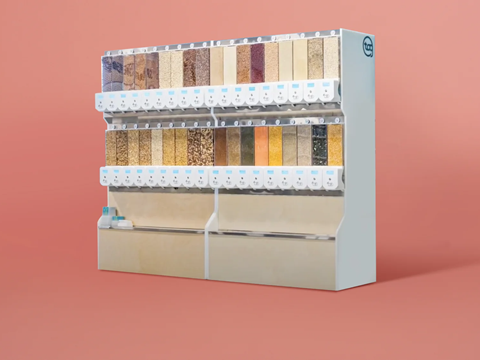
Nine companies were selected to test their innovations at Google foodspaces as winners of the corporation’s Single-Use Plastics Challenge, with solutions ranging from data-powered bulk food dispensers to edible cutlery.
Google launched the Single-Use Plastics Challenge in 2023. Aiming to help the food and beverage industry reduce its plastic footprint, it called for companies to submit their solutions for reducing or eliminating plastics.
Out of 350 applicants, nine were selected to test their products in Google’s campus cafes and kitchens in the US, working with foodservice partners like Canteen, Compass Group, and Guckenheimer.
Among the packaging-related entries, Incredible Eats provides edible cutlery. Said to be free of GMO ingredients, the products are made of wheat, oat, corn, chickpeas, and brown rice, and apparently hold their shape for half an hour in a hot soup of cold dessert.
Straws and forks have since been added to its edible portfolio, which is available in various sweet and savoury flavours. Incredible Eats claims to have replaced seven million pieces of plastic cutlery so far.
“Asking large food companies to entirely replace their plastic cutlery with our edible versions is difficult, but I know customers will choose an edible spoon when it’s offered to them as an additional menu item, and creating that awareness is key,” said co-founder Dinesh Tadepalli.
Similarly, Loliware produces cutlery and straws made of seaweed-based materials. Beyond the Single-Use Plastics Challenge, the company previously joined the Natural Polymers Group and encouraged policymakers to uplift natural polymer materials as valuable assets in pursuit of a Global Plastics Treaty.
Gaeastar manufactures 3D-printed cups made of clay. These are inspired by kulhar, handmade takeaway clay cups distributed by street vendors in India; after use, kulhar are smashed on the ground as a means of returning the clay to the earth.
On the other hand, Gaeastar’s cups are washable and reusable. It currently claims to be exploring an end-to-end waste life cycle model with the city of Zurich and a local coffee shop.
“Today’s plastic and paper to-go cups require vast amounts of resources and processing for only 15 minutes of convenience,” said Gaeastar founder Sanjeev Mankotia. “We simply have to provide better solutions to solve the pollution crisis.
“For people to adopt solutions, it’s really important to give them a nicer experience with the same convenience.”
Eco Refill Systems packages cooking oil in refillable stainless steel containers featuring a spigot, a nozzle for opening and filling, and an air valve to release pressure and increase or decrease oil flow.
Reportedly, each 10- and 50-litre vessel replaces three or twelve one-gallon plastic jugs used in kitchens. This is thought to have reduced the amount of empty plastic container waste by a weight equivalent to 89 passenger cars since 2015.
In its application for the Single-Use Plastics Challenge, Sun & Swell piloted reusable packaging for trail mixes, energy bites, and other snacks. Now the company sells its snacks in packaging made from paper, soy, and corn-based film, which is said to be compostable.
“We learned pretty quickly that the way the traditional food system is set up is not built to work with reusable packaging. It’s built to work on single-use plastic, and that has a lot of product, supply chain, and distribution implications,” said Sun & Swell CEO and founder Kate Flynn.
Now the company sells directly to corporate offices, hotels, stadiums, and catering companies with composting operations. It also offers a send-back programme for its compostable bags, which is aimed at consumers without access to composting facilities.
So far, Sun & Swell states that it has avoided the use of 850,000 plastic bags.
Meanwhile, The Aggressive Good (TAG) supplies smart touchless dispensers for bulk snacks. Using a digital screen, consumers can control the exact price and weight of their purchase without having to weigh items individually; a data analytics system is designed to optimize freshness and reduce food waste by keeping track of inventory.
Although it was intended for use in grocery stores, the dispensers are now available for corporate offices, fulfilment centres, and hotels.
“We want to make it easy for consumers and businesses to change habitual behaviors. Just because it has been done this way for many years, doesn’t mean it’s the best way to do it now,” said Geoffrey MacKay, TAG’s chief operating officer.
As part of the Challenge, Google also identified four companies working in Reuse-as-a-Service, or recovering empty packaging for refill. It says that it is currently exploring ways to incorporate such solutions across its workplaces.
Mike Werner, head of Sustainability Programs & Innovation at Google, commented: “After exhausting our food operations’ vendor supplier network in search of plastic-free solutions, we were motivated to explore more creative approaches. The Single-Use Plastics Challenge has been incredibly inspiring so far and I’m excited to see these solutions move to the next phase.”
The Single-Use Plastics Challenge falls under Google’s larger circular economy efforts, which use the ‘Refuse, Reuse, Reduce and Recycle’ to maximize its reuse of finite resources and design out waste and pollution.
Previously, the Google for Startups Ukraine Support Fund awarded Releaf Paper with $100,000 in funding and mentorship. The Ukrainian company extracts cellulose fibres from fallen leaves to make paper packaging, and the funds were intended to boost its growth and help it resume any business operations impacted by Russia’s invasion of Ukraine.
More recently, Amazon’s Sustainability Accelerator invited European climate-tech startups focused on building businesses in consumer products, circular economy, energy in buildings, and packaging to apply for funding. The deadline for the second cohort focused on consumer products is on 31st July 2024, with successful applicants set to be announced in the autumn.
If you liked this story, you might also enjoy:
How are the top brands progressing on packaging sustainability?
The ultimate guide to global plastic sustainability regulation













No comments yet